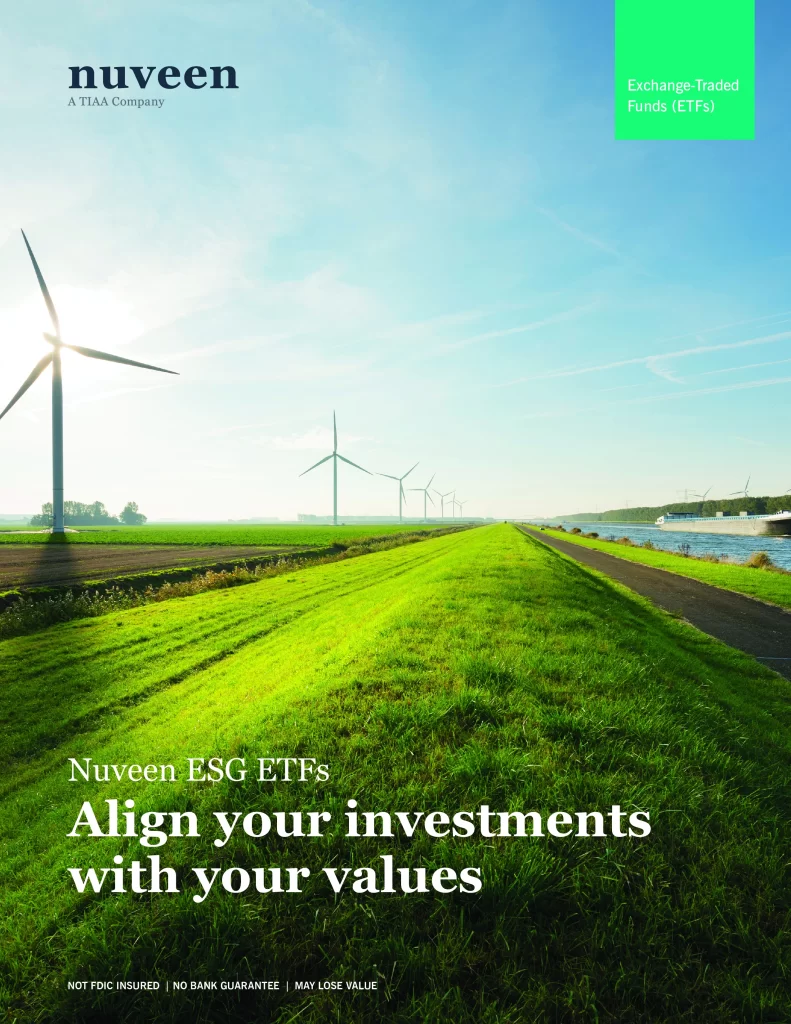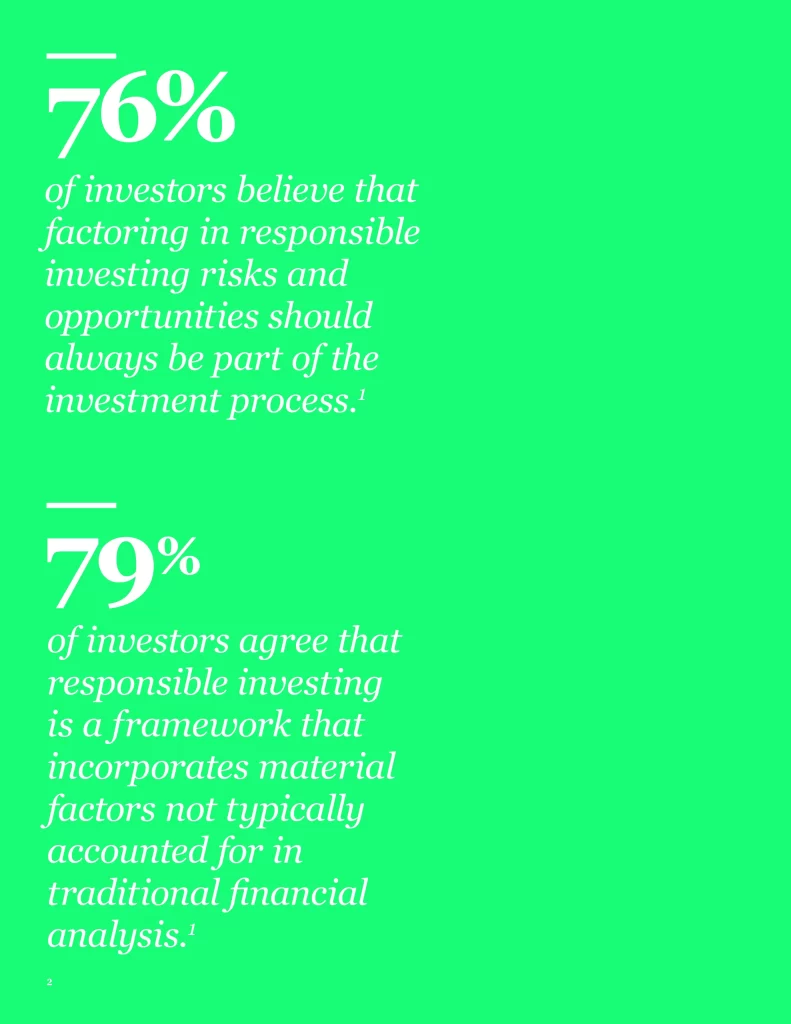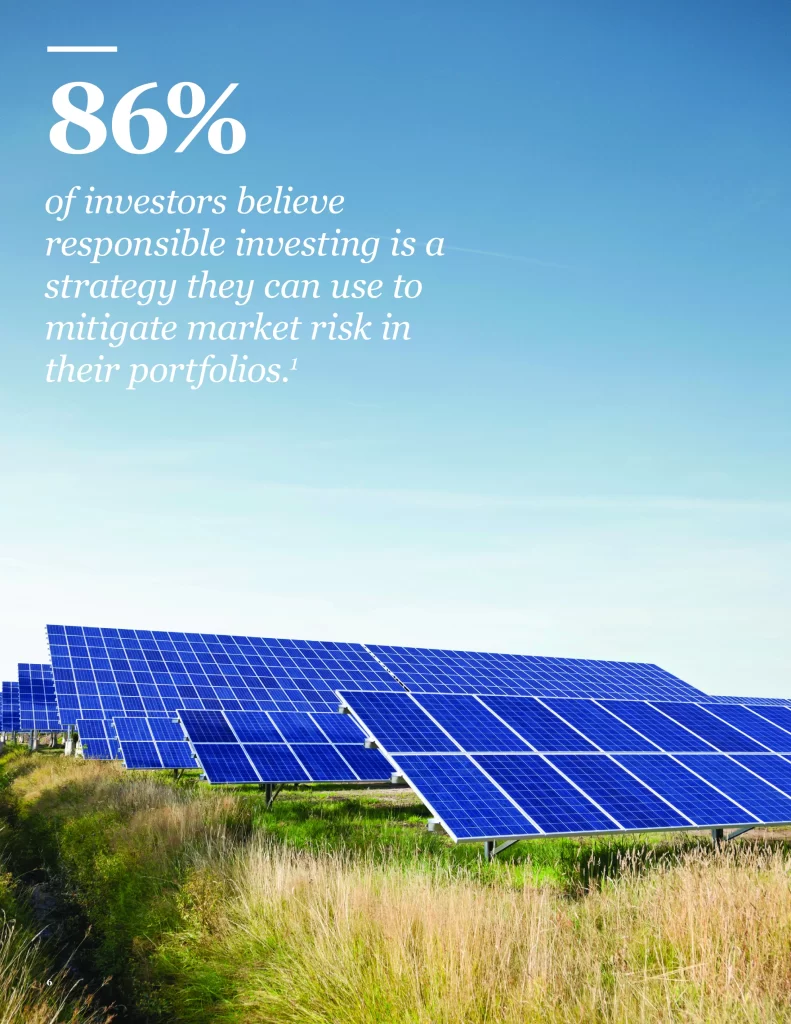What is ESG?
Align your investments with your values. Environmental, social and governance (ESG) exchange traded funds (ETFs) make sustainable investing easy for investors. These are umbrella terms used to describe various ways to incorporate ESG factors into the investment process. It appeals most strongly to investors who want to avoid investing in companies that don’t align with their values. Impact investors are typically interested in making a difference in the world or environment through the companies in which they invest.
- 76% of investors believe that factoring in responsible investing risks and opportunities should always be part of the investment process.
- 79% of investors agree that responsible investing is a framework that incorporates material factors not typically accounted for in traditional financial analysis.
- 86% of investors believe responsible investing is a strategy they can use to mitigate market risk in their portfolios.



Environmental
Climate change, natural resources, pollution and waste, environmental opportunities. Companies demonstrate concern for the environment when they choose to reduce their total carbon footprint, use sustainable energy, work in LEED-certified buildings, reduce waste, develop clean tech, and/or give back to environmental causes.
- Climate Change
- Natural Resource Usage
- Waste Management
Social
Human capital, product liability, stakeholder opposition, social opportunities. Social responsibility occurs when a company commits to paying living wages, accepting product liability, protecting data, and providing a healthy and safe work environment.
- Health & Safety
- Labour Management
- Product Safety & Quality
Governance
Corporate governance, diversity, corporate behaviour, transparency. Governance encompasses transparent company ownership and control, diversity, board independence, financial transparency, and ethics.
- Board
- Accountability & Transparency
- Business Ethics
What is an ESG ETF?
ESG ETFs cover a wide range of asset classes, sectors and geographies. Some screen out certain ‘controversial’ industries, such as tobacco or weapons. Others may focus on certain themes, such as fossil-fuel-free or gender diversity. These funds also offer many ways to incorporate responsible investment principles into your portfolio. This means you can use ESG ETFs to add many different levels of diversification to your portfolio. Core ETFs provide investment exposure that generally replicates traditional market benchmarks. Offering low-cost, transparent, and potentially tax-efficient portfolio solutions with the convenience of intraday trading.
- Climate Change: Investing in companies that are fighting climate change.
- Natural Resources: Investing in companies that are preserving clean air and water, promoting responsible forestry, etc.
- Pollution & Waste: Investing in companies that are reducing or eliminating pollution and waste.
- Human Capital: Investing in companies that are hiring and training disadvantaged populations.
- Corporate Governance: Investing in companies with strong governance, such as clean accounting.
Avoiding Controversial Business Involvement
Assesses companies’ exposure to and management of ESG-related risks and opportunities, and involvement in controversial businesses or events.
- Environment
- Customers
- Human Rights & Community
- Labor Rights & Supply Chain
- Governance
- Alcohol, Tobacco & Gambling
- Weapons & Firearms
- Nuclear Power
- Sudan (NUEM Only)
Carbon Screening
Selects companies based on current and future carbon emissions, with the objective of maintaining a portfolio with a significantly lower carbon footprint than the Base Index. Companies that own fossil fuel reserves are ineligible for inclusion. Issuers in the Independent Oil & Gas Producer, Integrated Oil & Gas Producer and Metals & Mining sectors are ineligible for inclusion.
- Absolute Carbon Emissions
- Carbon Intensity
- Potential Future Carbon Emissions
Conclusion
Investing sustainably has the potential to uncover hidden risks, capture emerging opportunities, and deliver enhanced performance. Climate risk and data security risk, as examples, could be overlooked in traditional financial analysis, but continue to grow as material risk factors and can have a direct financial impact on companies. By integrating ESG considerations into the investment process, investors are better able to assess a company’s long-term risk and return prospects and potentially enhance their portfolios’ risk-adjusted returns.





